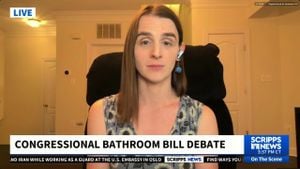Billionaires Elon Musk and Vivek Ramaswamy are gearing up to lead what they describe as the Department of Government Efficiency, or DOGE. Appointed by Donald Trump, the duo aims to slash federal spending by up to $2 trillion from the federal budget, which stands at about $6.7 trillion annually.
This ambitious initiative, described as the "Manhattan Project of our time" by Trump, has raised eyebrows and questions across various sectors. The potential for massive cuts to government programs—from healthcare to environmental regulations—could reshape how Americans experience government services.
Musk, who gained fame through companies like Tesla and SpaceX, has been vocal about what he sees as the dangers of overregulation. He expressed concern over the nation's multitrillion-dollar debt, claiming it's likely to lead to financial strife. He said, “We risk strangulation by regulation,” echoing sentiments shared by economists worried about the nation's financial health.
Under the new leadership, DOGE plans not only to cut unnecessary expenditures but also to modify how federal agencies operate. Ramaswamy points out specific targets for cuts including the Corporation for Public Broadcasting, which receives $535 million annually, and international grants totaling $1.5 billion. They also aim to trim about $300 million allocated to organizations like Planned Parenthood.
While such cuts may seem like targeted solutions to fiscal issues, regulatory experts warn about the potential fallout. Regulations safeguard public health, workplace safety, and environmental protections. According to legal experts like Michael Gerrard from Columbia University, revoking regulations without thorough consideration could put lives at risk. He stated, "Revoking regulations will endanger people’s lives. I’m very worried.”
Musk and Ramaswamy also suggested the idea of “mass head-count reductions” among federal employees, particularly within agencies they deem bloated. They argue this restructuring would trim down the federal workforce significantly, hinting at possible layoffs and consolidations. Their proposal to require federal employees to be present five days weekly is expected to prompt many workers to voluntarily leave, something Ramaswamy has referred to as creating “a wave of voluntary terminations.”
Among the most contentious potential cuts mentioned is funding for veteran healthcare, which has already risen to $119 billion for fiscal 2024. While not naming specific areas for cuts, both leaders highlight their intent to eliminate unauthorized spending. This estimation becomes tricky, as many of these programs, such as veterans’ health care, are upheld by statute.
Not only does DOGE aim to decimate the budget allotted to cultural organizations and social services, but they are also targeting potentially once-protected standards—in environmental and health safety. For example, the Biden administration recently implemented stricter air quality standards to reduce soot pollution, which experts say could prevent thousands of premature deaths annually. If Musk and Ramaswamy succeed, such regulations could come under threat, posing public health risks for millions.
On the employment front, Musk believes the possible long-term outcome could see federal workers transitioning toward the private sector. He rationalizes this will be facilitated through early retirement incentives and severance pay, which could help mitigate the sudden loss of jobs. He pointed out, "The president can use existing laws to give them incentives for early retirement and make voluntary severance payments." This would help to create smoother transitions for laid-off employees.
Underneath the bold promises and grand narratives of efficiency lies skepticism about the practical execution of such plans. Many experts are unsure how effective these measures would be, especially considering past attempts at reforming government procedures. Let’s not forget instances like the Grace Commission aimed at improving government efficiency during the Reagan administration, which suggested thousands of recommendations yet saw minimal implementation.
Over years of proposals aimed at cutting federal spending, tangible results have often eluded the government. Since they plan to operate primarily outside traditional governmental frameworks, skepticism has also arisen around DOGE's actual legal powers. The Impoundment Control Act set forth limitations on how much spending the president can unilaterally halt, which legal experts argue will confine the scope of reforms attainable under Musk and Ramaswamy's leadership.
While the president-elect Trump echoes support for their plans, saying they will work together to streamline government, there remains substantial opposition and possible backlash against broad budget cuts. Critics argue such measures may favor corporate interests over protecting the needs of everyday Americans.
The Biden administration's recent safety and environmental regulations might find themselves on the chopping block if the new administration follows through on DOGE's ambitious agenda. From air pollution standards to heat safety measures for workers, advocates fear what the future might hold.
Advocacy groups and experts are not taking the proposed cuts lightly. The fear is palpable within various sectors as individuals brace themselves for potential loss of hard-fought rights and protections. The push for efficiency could yield unintended consequences; cutting corners to funnel money may leave significant portions of the American populace vulnerable and without recourse.
The path to implementing these changes isn't necessarily straightforward. Jobs hang in the balance as Trump’s new administration gets rolling. The promise of bulldozing old bureaucracies could either incite admiration or lead to significant civil unrest. Observers will have to wait and see how DOGE’s proposals manifest and how they will truly affect the fabric of American governance.
Leaders like Musk and Ramaswamy are paving the way for their deregulatory agenda, but how will the general populace react to potential shifts? Perhaps people will become more engaged, demanding clearer oversight and quality assurance on the proposed changes. One thing remains clear: with government efficiency plans by DOGE gaining traction, the consequences will play out over years and will shape the next chapter of governance and public life.



